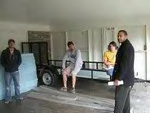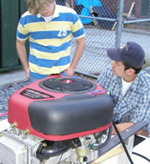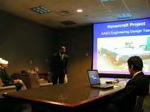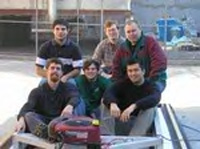
Armstrong Atlantic State University
Applying classroom education to real world design
 |
|
Dr. Cameron
Coates and members of the AASU Engineering Design
Team prepare to build their hovercraft.
|
|
Engineering students at Armstrong Atlantic State University
in Savannah, Georgia, are following in the footsteps
of renowned hovercraft inventors Sir Christopher Cockerell
of Great Britain and Dr. William Bertelson of the United
States. They aren't just building a DiscoverHover
One hovercraft … they're using the information
on DiscoverHover.org to create their own original hovercraft
design.
Dr. Cameron Coates, Assistant Professor of Engineering
Studies in AASU's School of Computing, reports that
this is the first time he has undertaken a hovercraft
project with his students.
"It was not my idea, it was theirs; they were
pretty enthusiastic about it," he says. "They
asked me what I thought about getting pre-designed
plans or designing their own hovercraft. Since I teach
design, I wanted them to engineer from scratch, realizing
it was an excellent opportunity for them to learn
all the issues involved with coming up with a new
design, and really get a chance to exercise their
own ingenuity, creativity and resourcefulness."
|
|
 |
| |
AASU's hovercraft engines
were donated by Briggs & Stratton. |
But when Dr. Coates found the DiscoverHover web site,
he passed it on to his students. "I wanted them
to do full-fledged research on what's out there. But
DiscoverHover has been a large part of that,"
he says, "The site is great, very positive. You
can take this project and look at it from all different
levels. It can be applicable to middle to high school
students to graduate students."
Even though the AASU hovercraft project is a function
of the Armstrong Engineering Club, Dr. Coates explains,
"We're not just building it, it's actually a
course. There's a grade for the last two semesters
as well as this semester, so we treat it as a serious
learning experience."
The AASU hovercraft project is giving its students
realistic experience in areas far beyond that of engineering
design. The team raised funds to build their hovercraft
by introducing it in a highly professional manner
to potential donors. First they created a detailed
PowerPoint presentation. Next, they sent letters to
area businesses to explain the project, then made
appointments to go out to show their PowerPoint presentation
in person.
 |
|
AASU Engineering
Design students present their hovercraft project
to potential donors.
|
|
"It gets sponsors really excited about the project,"
says Dr. Coates, "and it lets the students know
what it's all about outside of school when you need
to sell a proposal."
This approach convinced a nearby Briggs & Stratton
plant to donate two engines to the students' hovercraft
project.
Dr. Coates has expertly woven such practical experience
into his students' building of their hovercraft because
he believes "The most valuable aspect has been
giving them experience with the practical aspects
of design, for example money, budgeting, choosing
the right component – the things you don't get
in school."
|
|
 |
| |
The Armstrong Atlantic State
University Engineering Design Team in their hovercraft. |
His students have also designed a web site with extensive
photo galleries to showcase their hovercraft project
at www.hummercraft.com.
Once the hovercraft is completed, Dr. Coates and
his students will host a special event "where
all contributors will come and celebrate our accomplishment."
The hovercraft has already been entered into an engineering
presentation competition, where the AASU team won
first place, and they plan to enter it into other
academic competitions in the near future. They are
also considering selling hovercraft rides at the university's
AASU Day.
The hovercraft will remain at either the Armstrong
Atlantic or Georgia Tech campus, to use as a marketing
tool for the engineering programs at both schools.
Dr. Coates plans to use the craft "to demonstrate
to high schools and say, Hey, look what you can
do at AASU; look how much fun you can have!"
|